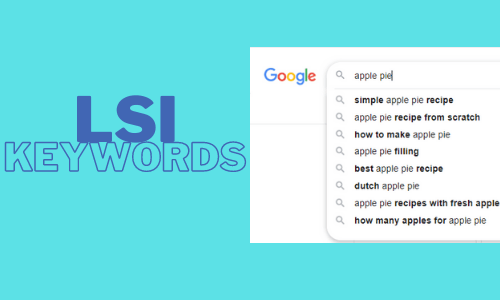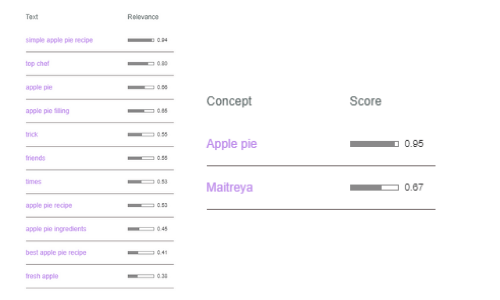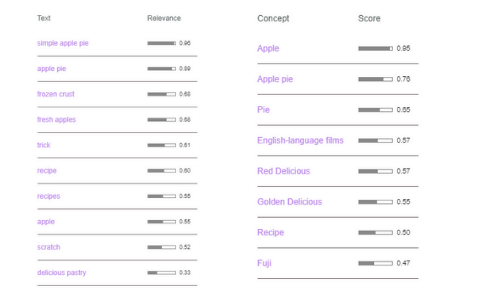What are LSI Keywords
You have probably come across the LSI Keywords abbreviation a hundred times, but as a recap, LSI keywords are phrases or words that semantically related to your topic. And LSI stands for latent semantic indexing.
LSI keywords are not used as the main keyword that your content is focused on. They are keywords that should also be stated in your content to let search engines know that the content is about the long-tail keyword you are focusing on. Essentially, they help improve the content to make it rank for the long-tail keyword.
The SEO community at large argues whether or not LSI keywords are a ranking factor or not, which is what we will discuss today.

How Google Uses LSI Keywords
As you may already know, search engines such as Google would use the frequently used words on a page to figure out the page’s topic. This is how many web pages ended up was keyword stuffing. So, if the page mentions apple pie a lot, Google would then assume that the page is about apple pie.
However, Google has gotten smarter and relied on LSI keywords to get the overall topic of the page. Again, if the page is about Apple pie, Google will search the title tag, URL, page content, image alt tags etc., to see if the page is really about apple pie.
They will then also search the page for LSI keywords such as recipe, filling, ingredients, crust and spice to determine the topic – apple pie. These words are most likely to occur a lot when you talk about the topic of apple pie. It is important to remember that LSI keywords are not synonyms of the keyword; however, they are closely related to the keyword.
Are LSI Keywords a Ranking Factor?
Many webmasters believe that LSI keywords are a big part of Google’s ranking factor. They argue that it’s because when using LSI keywords in your content, you are using recent, popular keywords that make your content fresher and present.
This is because LSI Keyword boosts your search visibility and contextuality. By using these keywords, you can better the search experience for users and help how to search engines understand your page, which in turn boost your ranking power. Another reason why LSI keywords gave the impression that they are important because Google implemented latent semantic indexing into their search algorithm in 2004.
Then there are individuals like John Mueller who strongly disagree with the concept of LSI keywords. And in 2019, John Muller tweeted that “there is no such thing as LSI Keywords — anyone who’s telling you otherwise is mistaken, sorry.” Another source explains the concept of LSI as old technology, having been created to index known document collections as well as being patented technology. Google will use the information on your page to rank the page for relevant queries.
Bill Slawski tweeted that LSI keywords are not Google autocomplete terms, Google keyword suggestion tool terms, ubersuggest terms, etc. he also said that those terms have their technology and processes and do not use LSI.
The reason for this stems from the fact that Google has gone from ranking your page according to where you use your keyphrase to how you use the term and its related terms on your page. So, Google has gone from ranking an apple pie page according to how that particular keyword is used in every heading, meta description, meta titles, image alt tags to ranking the page based on the semantically related terms.

Autocomplete Keywords vs LSI
Many webmasters use the Google autocomplete keywords as they appear rather than adding that LSI keyword within the content where it contextually makes sense. But which method is correct? Also, are LSI Keywords Important
So, with the apple pie example, the LSI keywords are all the things that you could easily think of that are related to making an apple pie. They also include things that you would need to make the apple pie. So rather than just having an apple pie filling or apple pie crust recipe as headings on your page. You would initially use the words filling, recipe, crust within the content.
Using tools such as keyword planner and the LSIgraph, you will be able to find top related terms that you can use within the content.
So, we put this theory to the test to see which method was more effective. We wrote two different word paragraphs using the autocomplete terms verbatim. And another where the LSI keywords were used where they made sense. Here is what our alchemy results showed:
Example one – Autocomplete Terms
The trick to making a simple apple pie recipe that you can share with friends is to learn how to master making an apple pie filling. It all starts with finding a tried and trusted apple pie recipe with fresh apples that you can rework. Make sure you have all the apple pie ingredients and start baking. Like with all top chefs, you need to practice how to make apple pie a few times before coming up with the best apple pie recipe

Example two – LSI keywords
The trick to making a simple apple pie is to find a recipe that has been tried and trusted. Whether you are making an apple pie with a frozen crust or using recipes with fresh apples, the trick is in making a delicious pastry. Before you know it, you will have the best how to make apple filling recipe from scratch.

Final Thought
It won’t harm your content having both the autocomplete keywords and LSI keywords in your content. It’s simply about it making sense. Also, some autocomplete phrases will not make sense and using them verbatim is not a must. The last thing you want is for your reader to feel as though you have missing words and complicated phrases in your text.
Remember, with autocomplete or Google LSI keywords, these are the popular and relevant keywords at that particular time relating to the term you are searching for. Therefore, when you use them on your page, you may get good results for a limited time frame.
There are many other ways of making sure you rank, such as
- How to Use Reddit to Improve Your SEO Performance
- High Ranking Articles: What Sets Them Apart
- How Do I Write a Meta Description for SEO?
- How to Edit Your Copy
- Power Words: Writing the Perfect Meta Title & Description to Improve CTR.
- SXO 2021: Combining SEO and User Experience


